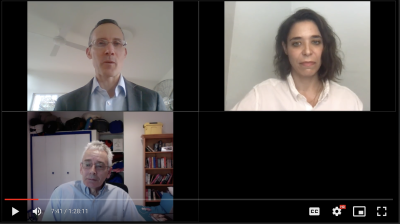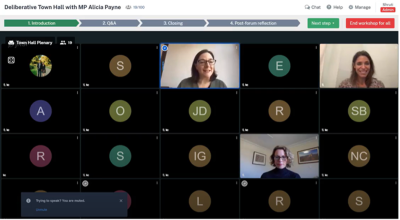Australian Parliament Deliberative Town Halls
IDEA collaborated with two Members of Australia's Parliament and designed an implementation of Deliberative Town Hall toolkit that compliments Australia’s parliamentary system. The first experiment in this initiative is a collaborative project between IDEA and the Centre for Deliberative Democracy and Global Governance at the University of Canberra. This project aims to link a representative sample of constituents with their elected official in productive town hall conversations about the issues subject to parliamentary debate in Australia. The project seeks to involve more Australians in the democratic process and expand MP's knowledge about the potential benefits and uses of deliberative democracy.
This project builds on the research from our initial Connecting to Congress project.
Town Hall on Mitochondrial Donation with Andrew Leigh MP

In September 2020, IDEA and our Australian partner, the Centre for Deliberative Democracy and Global Governance, held two Deliberative Town Halls with Member of Parliament Andrew Leigh. These events focused on mitochondrial donation, a medical procedure – illegal at the time – that was set to undergo a conscience vote in Parliament. As a “conscience vote,” a relatively rare (occurring roughly once per term) type of vote where MPs do not have to vote along party lines, Leigh MP was free to vote entirely at his discretion.
Greeted with this unique opportunity, Leigh MP partnered with IDEA to engage in a deliberative democracy exercise with his electorate. In two town hall meetings, one online and one face-to-face, a series of constituents from Leigh’s electorate of Fenner were randomly selected to weigh the issues surrounding mitochondrial donation. Prior to these events, Member of Parliament Leigh agreed that his vote would be guided by the conclusions of these Deliberative Town Halls.
Impact
After the DTH, participants in both town halls overwhelmingly believed that mitochondrial donation should be made legal in Australia. In a statement on the Mitochondrial Donation Law Reform Bill in late 2021, Leigh MP said that: “the overwhelming sentiment among those who attended the forum was to support mitochondrial donation, and I will be voting in favor of this bill.” The majority of the House of Representatives, including Leigh MP, voted in favor of the bill on December 1, 2021. The Bill passed in the Senate on March 30, 2022; mitochondrial donation became legal in Australia on October 2, 2022. More information on the Bill can be found here on the Parliament of Australia website.
Town Hall on Young People and Australian Politics with Alicia Payne MP

In August 2021, IDEA and the Center for Deliberative Democracy and Global Governance partnered again to organize and facilitate a Deliberative Town Hall with Member of Parliament Alicia Payne on the issue of increasing youth participation in politics. The focus of young people was chosen as there is an increasing generational gap between those in power and the nation’s youth; today, the average age of an Australian MP is 52. As the decisions these lawmakers make will have lasting effects for decades, including young people more in the political process will give them greater agency over those who make the decisions that will affect their futures.
Sixty-one constituents in Payne’s district responded to a pre-survey on their opinions of Payne and the subject of youth involvement in Australian politics before participation in the DTH. During the event, five key issues were discussed: education, employment, costs of living, equity and inclusion, and climate change. In addition, four potential policies to ensure policy-makers are hearing the concerns of young people were discussed: funding for youth advocacy organizations, consulting young people directly, lowering the voting age, and encouraging young people to join existing formal political institutions.
Impact
After the DTH, 88% of participants emphasized the need for greater participation and consultation of young people in decision-making. Most policy proposals received broad support, particularly integrating voter enrollment into civics education, which had 95% approval. Despite varied opinions on lowering the voting age to 16, there was significant backing for multiple engagement strategies, including digital and in-person events. Participants emphasized the need for sustained, institutionalized mechanisms to incorporate youth perspectives, such as annual citizens' assemblies. The town hall facilitated valuable intergenerational dialogue, with both older and younger participants appreciating the opportunity to share diverse viewpoints and engage directly with their MP. Overall, both the Members and participants viewed the event as a constructive step toward fostering greater youth involvement in politics.
Here is a recent PDF report on this project.
